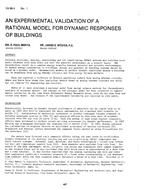Regression models of measured energy use in commercial buildings are becoming an increasingly popular method of determining retrofit savings or identifying operational and maintenance (O and M) problems. When hourly monitored data are available, an issue that arises is what time resolution to adopt for regression models to be most accurate. Addresses this question by comparing monthly, daily, hourly, and individual hourly or hour-of-day (HOD) multiple linear regression (MLR) models when applied to measured cooling energy consumption (Ec) in commercial buildings. Ec consumption in five large commercial buildings in Texas (both under dual-duct constant-volume [DDCV] and dual-duct variable volume [VAV] operation) is modelled in all four time scales functional forms based on engineering principles. The relative advantages and disadvantages of all four types of models are discussed and compared. The outdoor dry-bulb and dew-point temperatures accounted for most of the variation (80% or more) in Ec. Although the monthly models had higher model R2 than daily, hourly, and HOD models, the daily and HOD models proved more accurate at predicting Ec. Also, the HOD models had higher model R2 and lower coefficients of variation (CV) than the hourly models. The results of this study suggest that daily time scale models are most advantageous for retrofit savings determination, while HOD models are best for O and M purposes.
KEYWORDS: year 1995, calculating, cooling load, energy consumption, commercial, buildings, operations, maintenance, failure, dual duct air conditioning, constant volume air conditioning, variable volume air conditioning, air conditioning, comparing, temperature, dew point, accuracy
Citation: ASHRAE Trans. 1995, Vol.101, Part 2, Paper number 3895, 172-185, figs., tabs., refs.
Product Details
- Published:
- 1995
- File Size:
- 1 file , 1.5 MB
- Product Code(s):
- D-16898


